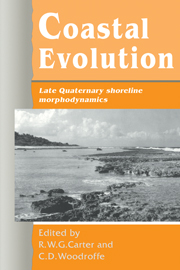Book contents
- Frontmatter
- Contents
- List of contributors
- Dedication J.D. Orford
- Foreword
- 1 Coastal evolution: an introduction
- 2 Morphodynamics of coastal evolution
- 3 Deltaic coasts
- 4 Wave-dominated coasts
- 5 Macrotidal estuaries
- 6 Lagoons and microtidal coasts
- 7 Coral atolls
- 8 Continental shelf reef systems
- 9 Arctic coastal plain shorelines
- 10 Paraglacial coasts
- 11 Coastal cliffs and platforms
- 12 Tectonic shorelines
- 13 Developed coasts
- Index
Foreword
Published online by Cambridge University Press: 06 July 2010
- Frontmatter
- Contents
- List of contributors
- Dedication J.D. Orford
- Foreword
- 1 Coastal evolution: an introduction
- 2 Morphodynamics of coastal evolution
- 3 Deltaic coasts
- 4 Wave-dominated coasts
- 5 Macrotidal estuaries
- 6 Lagoons and microtidal coasts
- 7 Coral atolls
- 8 Continental shelf reef systems
- 9 Arctic coastal plain shorelines
- 10 Paraglacial coasts
- 11 Coastal cliffs and platforms
- 12 Tectonic shorelines
- 13 Developed coasts
- Index
Summary
The International Geological Correlation Programme (IGCP) is concerned with networking and research projects of continental to global scale and scope. In the case of IGCP Project 274, ‘Quaternary coastal evolution: case studies, models and regional patterns’ (short title: ‘Coastal evolution in the Quaternary’), much of the initial network and research focus came forth from two previous IGCP Projects: No. 61 (1974 to 1982) and, in particular, No. 200 (1983 to 1987). These two earlier Projects dealt primarily with the global variation in relative sea-level (RSL) changes during the last 15 000 and 200000 years respectively. At the final meeting of Project 200 (held in Halifax and Ottawa Canada in 1987) an overwhelming majority favoured continuation of sea-level and coastal research under the stimulating IGCP umbrella of UNESCO and IUGS. Project proposal No. 274 was submitted in October 1987 and endorsed as Project No. 274 in March 1988 to run until 1992 (later extended to 1993). The inaugural meeting was held on 22 September 1988 during an International Symposium on ‘Theoretical and applied aspects of coastal and shelf evolution, past and future’, held in Amsterdam from 19 to 24 September 1988.
The topic ‘coastal evolution’ was generally considered the natural choice for a follow-up project given the focus and results of the two foregoing IGCP sea-level projects.
- Type
- Chapter
- Information
- Coastal EvolutionLate Quaternary Shoreline Morphodynamics, pp. xvii - xxiiPublisher: Cambridge University PressPrint publication year: 1995



